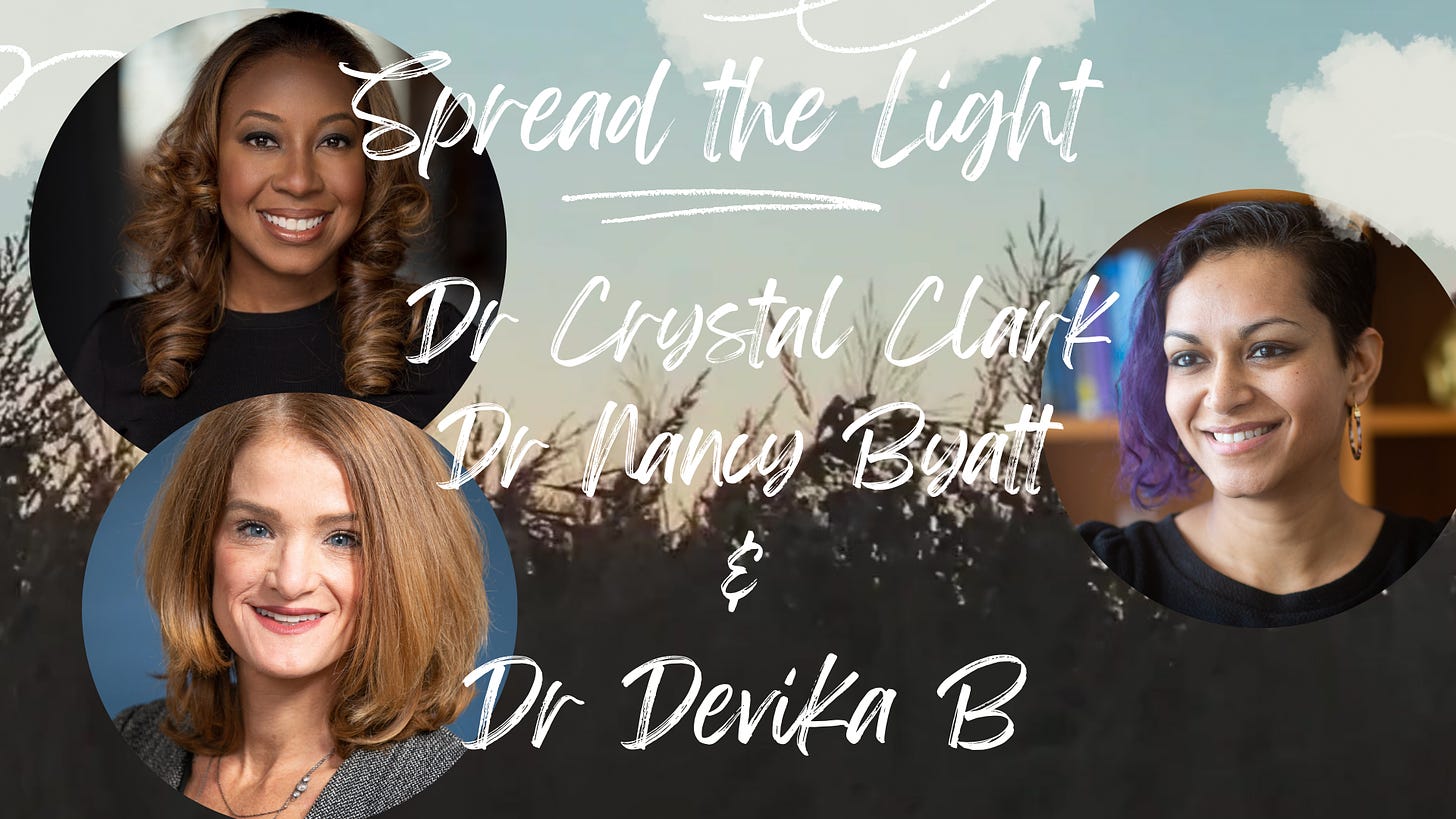Dear community,
Welcome to Season 2 of Spread the light with Dr Devika B. Here, we know that stigma festers in the dark and it scatters in the light. And this season will take that even further. We’ll dive into the ways that stigma shows up in culture, in norms, in policies, and in institutions — and how we can disrupt and rewrite that.
💫 Spread the light with Dr Devika B. Conversations that dispel stigma and stereotypes and instead, spread hope and light — also on YouTube, Apple, Spotify
Because stigma festers in the dark and scatters in the light
To kick us off: In this powerful interview with perinatal psychiatrists Dr Nancy Byatt and Dr Crystal Clark, hear about what breastfeeding guidelines miss about the potential mental health risks for new mothers and families. More to come on this pivotal topic next week in Slate!
Nancy Byatt, DO, MS, MBA, is a perinatal psychiatrist with the Women's Mental Health Center at UMass Memorial Medical Center, Executive Director of the Lifeline for Families Center and Lifeline for Moms, an iSPARC research program, Medical Director of Research for the Massachusetts Child Psychiatry Access Program (MCPAP), and a tenured professor of psychiatry, ob/gyn, and population & quantitative health sciences at UMass Chan Medical School.
Crystal Clark, MD, MSc, is a perinatal psychiatrist, associate professor at the University of Toronto, and scientist at Women’s College Research Institute. Dr. Clark is internationally recognized for her expertise in the treatment of women’s mental health across the reproductive life span (i.e., menstruation, pregnancy, postpartum, infertility, trauma related to reproduction). Dr. Clark’s research expertise is in optimizing treatment for parental mental health among Black, Indigenous, People of Color and peripartum dosing guidelines for bipolar disorder.
Trigger warning: In this interview, we talk about mental health impacts of breastfeeding, trauma, and gender inequities related to parenting labor.
Above, you’ll find the audio recording of the podcast episode and below, a transcript. The written version of the conversation has been lightly edited for clarity and length.
Click here to catch up on other Spread the light columns, in addition to other posts organized by column type, going back to our newsletter’s launch in January 2023.
If you or a loved one needs help for a mental health crisis, don’t hesitate to call or text 988 — or reach them online here. Find other resources here, search for a US treatment facility here, and find a US-based therapist here.
Wishing you light,
Dr Devika Bhushan
DB: I’m a pediatrician, and I’m also somebody who has bipolar disorder, who has been through a pregnancy and luckily, didn’t have a relapse. One of the biggest things that kept me safe is that my psychiatrist recommended from the get-go that I not breastfeed, for sleep protection.
So to start: When do you think about formula feeding versus breastfeeding for patients around mental health protection?
NB: Great question. First, thank you for sharing your lived experience, both in your article and for what you do, because it’s just so important that we all do that. And my passion for this work is also deeply rooted in my own personal experiences.
So when we think about breastfeeding, people often hear ‘breast is best.’ I know I heard it when I had my kids. I know I put a lot of pressure on myself to breastfeed. It felt like my self-efficacy as a mother was very tied to my ability to breastfeed. And I feel like it is for a lot of the people I’ve worked with as their psychiatrists — and a lot of my friends.
And so I think that breast is great. However, I do not think that breastfeeding trumps maternal mental health. And I think that is a huge misconception.
It’s also my experience as a perinatal psychiatrist, seeing women over many years now, people often are hearing a message that it’s really important to breastfeed. ‘It’s best for your baby.’ And people get, I think — understandably — really, really focused on it. And sometimes peoples’ value as a parent gets really tied to their ability to breastfeed.
And that’s a misconception. We can be amazing parents, you know, and not breastfeed or chest feed. It’s not necessarily the end all, be all.
That said, breastfeeding can be wonderful, and for some people, it can be a really good experience.
When it’s not a good experience, often, our role is to help people figure out what’s going to be best for them and their baby.
And what’s best for the parents is often what’s best for the baby.
And I think that's the piece that often gets missed with breastfeeding.
We get so focused on, ‘Well, the baby needs breast milk,’ but if the mom or the parents is up every two hours breastfeeding, then that may not be best for the baby because [the parent] may not be sleeping.
And when we think about bipolar disorder, we know that one of the risks for bipolar disorder is we need sleep. We all need sleep. [And for] any psychiatric illness — mood, anxiety disorder — we know that sleep is critical. It’s critical regardless of whether we have a psychiatric illness: We all need sleep and it affects all of our mental health and well-being.
And so if breastfeeding is interfering with that, as it often does, that’s when I really think we need to reassess and think, ‘Is this best for Mom and baby?’
CC: When I think about promoting formula feeding first for a patient, it’s really someone who is high-risk for sleep deprivation being a trigger for destabilizing them. Of course, in the postpartum period, it’s hard to say that people are going to get optimal sleep, but if breastfeeding is going to be a main thing that they’re getting up for, we want to cut out as many disruptions as possible.
And I will advise someone, for instance, who has bipolar disorder. We’ve already determined in their illness course that, you know, just a little bit of sleep disruption on a normal Tuesday is enough to destabilize them. Then I’m trying to cut out anything that's going to increase that risk for destabilization.
DB: That’s really helpful. And so other than bipolar disorder, are there other diagnoses where you might consider it, as well?
CC: It is definitely not limited to bipolar disorder. And this is not a one-size-fits-all recommendation. It’s very much personalized to that individual and that illness course.
I definitely have other patients with other diagnoses, whether that’s depression or schizoaffective disorder [for whom] sleep disruption or just the stress of on-demand breastfeeding [is not advisable].
Or they’re having so much trouble and they’re not producing enough milk and the baby’s not latching on. We don’t need to shame you and make you feel like, ‘Oh, if you don't figure this out, despite the challenges you’re having, that you should keep doing this.’ When this is now increasing your anxiety, causing you to feel depressed because now you’re beating up on yourself.
So those are circumstances in which I’m like, ‘Can we supplement? Do you feel comfortable?’
DB: So it sounds like there’s two categories of patients [where you would recommend not breastfeeding]. One is someone who has a known predisposition to sleep deprivation causing an episode. And then another is anybody for whom it’s becoming such a struggle and uphill battle that it actually is adversely impacting their mental health.
NB: I think breast is great, but not at the expense of parental mental health, right?
I’ve worked with postpartum individuals whose OB, for example, has sent them. They thought they had an anxiety disorder. And by the time they saw me, and the OB had for example, started something to help them sleep, like a benzodiazepine.
They got a night’s sleep. By the time I saw them, they were completely asymptomatic — didn't have any symptoms because they had slept.
In working with the OB, they had slept very little over a week and they appeared so anxious. The OB calls like the patient’s in a crisis, may need to go to the ER [emergency room] — then they get a night of good sleep and it lyzes the anxiety.
People go days and days without sleep — extraordinarily common in the postpartum period. And so, even if someone doesn’t actually have an existing anxiety or mood disorder, just that lack of sleep, they can actually present with symptoms because lack of sleep affects all of our mental health.
And then as Crystal was saying, there’s people who we know have an underlying illness. It’s even more important then. For depression and anxiety, lack of sleep is going to make any of these illnesses worse. Getting adequate sleep is a critical part of any mental health treatment plan.
CC: I think Nancy and I probably see plenty of patients like this where we’re saying, ‘Okay, yeah, you’re anxious because you haven’t slept in days.’
A patient the other day, she’s like, ‘Well, I got a newborn’ and I was like, ‘Yeah, but I’m going to need your husband [to help get you] a few hours of sleep.’ You have not slept and I cannot take away this with a pill. Nothing I'm going to be able to do can help you until you can get some sleep.
And she ended up getting some sleep and she’s like, ‘Yeah, I feel a lot better.’
DB: [Sleep is] treatment, for sure.
NB: I think part of what happens in the postpartum period is people think, ‘Well, I’m going to deprive myself of my needs. I’m gonna focus on my baby.’ [And that includes ignoring their need for sleep.]
However, the data, our experiences — it’s very clear that that’s actually not what’s best for baby, but that’s a common misconception.
DB: Culturally, there’s this script that motherhood entails self-sacrifice and people are just automatically bought into this idea that: ‘I have to feel uncomfortable in order to be a good mother.’
NB: Yes, exactly.
CC: Patients say that exactly: ‘Well, I have to do what’s best for the baby.’ And I say, ‘And what’s best for the baby is also what’s best for you,’ you know? ‘So you’ve got to do what’s best for you so that the baby can reap those benefits as well.’
But yeah, a lot of times it’s like, ‘If I just get through, the baby will be okay.’ And I'm like, ‘How are you making it, though?’
DB: Right. Even though very thoughtful perinatal psychiatrists are talking about this, actively weighing sleep in that risk-benefit assessment of what kind of feeding plan to create, why hasn’t this filtered into guidelines? [Guidelines from pediatric, obstetric, and public health authorities recommend exclusive breastfeeding through six months, and supplemental breastfeeding for up to two years. They overstate known benefits, while not adequately assessing and including costs.]
NB: It’s an excellent question.
I think that there’s a general misconception that in order to parent in a way that’s going to serve the best outcomes for the baby and for the child later on, that the baby's needs trump everything else.
And the baby’s needs are obviously really important. But they don’t trump the parents’. They’re synergistic. The thing that actually predicts childhood outcomes, infant outcomes, is relational health and the relationship between the two — and I think that piece is missing [in] these guidelines.
Our group actually did a systematic review and what we actually found was that yes, breastfeeding is associated with good outcomes, positive outcomes [when it goes well]. However, when a parent planned to breastfeed and then having difficulty — then it actually worsened [mental health] outcomes.
Breastfeeding was associated with negative outcomes. That’s the piece that’s under-appreciated.
We all get pulled to this, ‘Oh, well, you know, breast is best and we’re going to focus on what’s best for the baby.’ This has also seeped into our medical profession and into obstetric care. Particularly once the baby’s born, we’re less focused on the parent’s mental health.
Look at OB care: there is one visit after the postpartum visit.
And we've done focus groups of people who’ve said: ‘It’s like I’m a hot potato. I'm dropped as soon as the baby’s born.’
There’s all that work around the fourth trimester to try to address this. I know that ACOG [the American College of Obstetricians and Gynecologists] is doing a lot to focus on the parent themselves, and the relationship, and promoting the health of both individuals.
There’s been an evolution of this over time. And I think it’s newer [to acknowledge parental health costs of breastdfeeeding], and I think it hasn’t yet gotten into the guidelines. When we think about breastfeeding, we really need to focus on outcomes for the parent and the baby.
DB: The American Academy of Pediatrics’ approach to this is very much aligned with that ACOG ‘breast is best’ [campaign] and in pediatrics, of course, we have so many appointments in that first three- or four-month period and we do check in with Moms and talk about mental health.
But there’s this disconnect where we’re saying, ‘Hey, are you breastfeeding? How’s that going? How can I support your efforts to breastfeed?’ And we’re not thinking holistically about the family and their needs. And the training that I received as a pediatrician and the guidelines that we look at very much say, push breastfeeding and figure out how you can get them to do it if they’re formula feeding. And we don’t have a conversation related to the Mom’s mental health or the family’s overall holistic well-being around feeding at all.
NB: Ideally, we’d be focusing on: ‘How is your relationship with your baby? And what role is breastfeeding playing into that?’ And that could promote bonding. Sometimes it does — and it’s amazing when that happens.
It doesn’t always. Sometimes it can actually exacerbate [not bonding well] if [breastfeeding is] not going well, or if it’s challenging.
I think we assume [breastfeeding]’s going to facilitate [bonding]. That is a misconception. It absolutely does not always facilitate it. We found that in our systematic review, too.
CC: We are behind on the discussion about breastfeeding and the impact on mental health. We [need to] come together as organizations — the Academy of Pediatrics, ACOG, APA [American Psychiatric Association] — to think about, ‘Okay, are recommendations really serving the mother-infant pair well?’
Often, some of my OB colleagues have said, ‘Well, you know, it's the Surgeon General’s report. This is what’s best.’ And I’m like, ‘Yeah, but if Mom is about to not be here because she’s become depressed or suicidal trying to breastfeed; or manic; or now she’s hospitalized and can’t breastfeed, then are we really meeting our goals for Mom and baby?’
I’m glad to hear the ACOG is having more of those discussions because that breast-friendly initiative — it was rough for my hospital at Northwestern when I was there. Forcing patients: The babies were just kind of given to the Mom, like, ‘Figure it out, breastfeed. We’ll help you.’
They wouldn’t take the babies away. So Mom’s been up 24 hours trying to breastfeed. And I had some patients decompensate in that context.
DB: I’m sure that was very frustrating from your vantage points.
NB: It was systematically sending a message that exacerbates many of the challenges — in a systematic way, embedded in the hospital protocols.
DB: Emily Oster and others have looked at that body of research that we cite as physicians to say breast is best: [The best (randomized) breastfeeding data do show small short-term benefits for babies, like 4 percent fewer gut infections and 3 percent less eczema in the first year, along with lower risk for mothers of breast and ovarian cancer. But [DB1] claims like enhanced intelligence, better parent-child relationships, and longer-term child health impacts like lower risk for high blood pressure, diabetes, asthma, or obesity, are not supported by high-quality randomized data.] What are your thoughts?
NB: My clinical experience, and also my view of the data is that yes, there [are] some benefits.
Those benefits certainly do not always outweigh the risks associated with breastfeeding. There are risks associated with breastfeeding, particularly when there’s challenges. And that is something that has not yet made its way into a lot of these guidelines — and even to evidence-based standard of care.
I think anyone in mental health who practices perinatal mental health could talk about this for a long time because we’ve all seen it. There’s a lag between what we see clinically and qualitative research — and the standard of care. These major [mis]conceptions that are still floating around out there around this.
DB: That is very powerfully stated. Anything you’d add to that, Crystal?
CC: I have not been convinced by the data for a long time. I’ve felt for a long time it was overstated.
NB: You know, often in obstetric care, the woman is seen as a vessel, right? There’s all these visits all the time while the baby’s still in utero. And then once the baby’s delivered, then there’s like, one visit.
With breastfeeding, similarly, we were like, ‘Oh, well, breast is best because the Mom's there to deliver the baby, give the baby the food.’ That conception of how we view women’s role in childbirth, parenting — it persists in breastfeeding.
DB: The AAP has published the mental health benefits of breastfeeding, but not the other side of that coin. You’re saying there are clear risks to breastfeeding. Who has to be convinced to systemically create a change in the standard [of care]?
CC: I think some of our policymakers, but more importantly, those who are on the frontline advising the patient — the people who adopted the breast-friendly initiative, and held true to it regardless of what they saw happening to the Mom, you know? So they were on the frontline enforcing it, pushing it, and saying, ‘Well, this is what the data shows and this is why it’s important’ because they believed in it. And they thought they were doing what was best for that Mom and baby.
It’s so important that we, as clinicians who are treating the patients, are well-informed and understand the risks and the benefits, as well as those who are making the decisions to push these initiatives and putting out the reports, and saying, ‘Well, this is the only way to care for your baby.’ It’s almost like this is the only way to love your baby is give breast milk, you know?
NB: I totally agree. Policymakers, providers, professional societies who are doing these guidelines, and I think also just society. So we value the woman beyond being a vessel for delivering and then feeding a baby. Not only should we do that because it’s the right thing to do, because we should value parents and perinatal individuals, and also because that’s actually going to be best for the outcomes of the dyad, right? For the baby, as well.
DB: Yeah. It took me so long to come onboard with my psychiatrist’s recommendation to not even try breastfeeding because of all of the training I’d had in pediatrics, which really skewed my perceptions around what was going to be best for the dyad. Because it’s not really focused on one part of that dyad — [the parent]. It’s really all about the baby.
I struggled so much with it, but it was absolutely the best decision. And it was such a blessing. I got to sleep eight hours every night, starting from the beginning. It was like a miracle [that I stayed well throughout the postpartum period].
NB: Amazing. Good for you. I appreciate you sharing that.
And I have no doubt, just purely based on my clinical experience and my personal experience that you having eight hours of sleep and making the decision to let go of breastfeeding and knowing that your health trumps breastfeeding — that the risks of doing it were going to outweigh the benefits — I’m sure that made all the difference.
DB: I really do think it did. And that’s why I wanted to do this article because it’s so striking to me that this conversation is absent outside of really thoughtful clinical encounters like the ones that you have… My psychiatrist was recommending it. My OB and my pediatrician were questioning it throughout.
CC: Yeah, and that’s a major problem. Talk about what needs to change.
Historically, I’ve definitely had to go to the pediatrician, go to the OB: ‘Can we get on the same page because I’m recommending this and you’re saying this?’ Some patients are going to believe their OB and pediatrician over their psychiatrist.
DB: Yes, because of the stigma.
CC: Yeah, exactly. For sure.
DB: Like this isn’t real. That’s real.
CC: Right. Exactly.
DB: So what have you all done? How has it been like having those peer-to-peer conversations? What has gone well and convinced them?
CC: I don’t know that it’s always convinced a peer. I think a lot of times because I show up and advocate, you know, we’re able to get on the same page. I have to really educate and provide information. They haven’t [always] read the chart. They didn't know the patient had this disorder.
I’ve had some really challenging situations in which just having a diagnosis — a pediatrician colleague thought she needed to call Child Protective Services because my patient had bipolar disorder.
We were going back and forth about breastfeeding. And it was my patient’s wish to breastfeed, but she was also taking lithium. And I was fine with that. We had talked about it at length. We’re on the same page.
So pediatrician comes in and tells her, ‘Stop taking lithium. Breastfeeding is more important.’
DB, NB: [What?!]
CC: Yes, I’m telling you. This was a real situation and I showed up on the unit. She's still in the hospital, postpartum.
Her husband actually called me. I try to have the partners involved as much as possible. He called and I was there.
And I spoke with the team and I went into details as to why it was so important for her to stay on her lithium — to keep her well — she had a history of very bad manias in which she would think she could fly and then try to do it.
But she’s otherwise had three children — beautiful, well grown, well taken care of — [and a] very supportive family, very supportive husband.
And so the pediatrician was like, ‘Well, she has bipolar disorder. I mean, she shouldn't be having kids.’
DB: (I’ve heard that, too, by the way, as a patient.)
CC: And [she] proceeded to say her child was not safe. And this got escalated to the ethics team. So it worked out okay, but that stuff still exists. This was not that long ago.
NB: Yes, there are these really challenging situations and we see this in pregnancy, too, right?
Where, particularly among general psychiatrists, they might say, ‘Well, the patient’s pregnant or breastfeeding, and so we need to stop all their medications.’ And again, they get focused on what’s best for the baby.
I started a statewide program in Massachusetts where we essentially provide training, consultation, and resource and referrals to build the capacity of any professional working with perinatal individuals. And so we have absolutely seen a shift. It is hard.
But they call us and they ask us questions and the key to teaching is it has to be ongoing. One training is necessary, but not sufficient, to change provider behavior or to change culture. They can call us if they have a question about someone they’re serving and then we also do one-time consults.
When they keep calling, it’s amazing how comfortable they can get providing pretty sophisticated psychiatric care. And we have data. They actually will treat bipolar disorder with our consultation — ideally, someone with bipolar disorder will have access to a psychiatrist. But here, if you have public health insurance, it might take 3 to 6 months. So we help them do that.
And what we found is that it really does shift. Like, we actually had a pediatrician call a couple of years into the program. And they were like, ‘I have a 16-year-old and she’s pregnant and I heard I’m not supposed to stop the meds.’ I was like, ‘Yes, that is why we’re here!’
And so our program’s now been around for over 10 years. And because we’ve been doing this and it’s a state-wanted program, the culture has shifted. It’s not a perinatal psychiatric utopia at all, even though there’s the perception of that sometimes. There’s still a huge amount of challenges, but I do see a change.
There needs to be ongoing consultation and thinking about how you change your workflow so that depression, anxiety care is really part of it. Just like diabetes. You know, we’d screen them; we’d give them some glucophage; we’d follow up to make sure the blood sugar was under control. Multi-component interventions are needed to truly change the way it’s being addressed.
You know, when we talk about breastfeeding… all the stuff that people experience — like trauma — comes up, right? So thinking about this from like a trauma lens, too. If someone’s already feeling that way, and then we’re like, ‘Well, you’ve got to just breastfeed at the cost of everything else,’ that can often exacerbate some of these things. It can absolutely be a trauma trigger. It’s so extraordinarily complicated. That’s another piece that needs to be better integrated into perinatal care.















Dr Crystal Clark and Dr Nancy Byatt on the hidden costs of breastfeeding